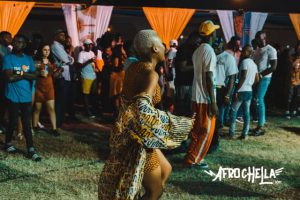Since the election of Donald Trump for the President of the United States in 2016, conversations around emigration from the U.S have been a topic in communities of color all over the country. Additionally, the year 2019 marks 400 years since the first African people were forcibly removed from their homes and brought to what we now know as the United States, which has sparked discussion surrounding a possible emigration of African Americans to the African continent.
During the holiday period, it seemed like every black celebrity you knew rang in the New Year in Accra, Ghana, which hosted a festival by the name of Afrochella, where more than 4,000 black people from all over the world came to celebrate the cultures and traditions of the African diaspora. The Ghanaian government has been spearheading the initiative to make it easier for descendants of American chattel slavery to reclaim their ‘Africanness’ by promising them a welcoming stay in the “motherland.” This of course seemingly benefits the nation, as they could potentially bring in  millions of dollars of revenue from hosting these black diasporic events. The President of Ghana, Nana Akufo-Addo, declared 2019 as the “Year of Return,” which of course highlights his intentions to capitalize on this urge to develop and sustain a nation free of racism and outside the systems that uphold white supremacy.
millions of dollars of revenue from hosting these black diasporic events. The President of Ghana, Nana Akufo-Addo, declared 2019 as the “Year of Return,” which of course highlights his intentions to capitalize on this urge to develop and sustain a nation free of racism and outside the systems that uphold white supremacy.
This pursuit is aspirational at best, and at worst is convoluted, exclusionary, and potentially damaging to already economically vulnerable countries. The idea of going back to Africa is not new, and black political thinkers like the writer and soldier, Martin R. Delany, have pondered this possibility dating as early back as the 19th century. Things that were issues with his theory in the 1800s continue to be issues to this day. For example, the discussion of Black people in the United States returning often occludes the drastic class differences between people of African ancestry living in the United States and African people in the continent. To an American, the prospect of living in a country like Ghana, where 1 US dollar is about 5.5 Ghanaian cedi, is attractive. But about 24% of Ghana’s population do not benefit from this lowered value currency.
This is not to paint Ghana as a nation devoid of all progress. In fact, according to Ghana Trade, the poverty rate has been cut in half since 1991. The nation is in a better state than many of her neighbors.
Another neglected population in this ‘back to Ghana’ scheme are the black people who do not have the luxury of travel and permanent migration. It is not easy to relocate generations of people to a whole new environment. And the exclusionary nature of this call for emigration is greatly evident in who attended the functions. Celebrities like, model and actress, Naomi Campbell, rapper Diggy Simmons, and actor Idris Elba were all adorned in the latest Kente cloth fashions, telling their fans about how welcoming Ghana is. Will Ghana be welcoming to migrants who don’t have millions of dollars to help with “development”? Also, is there not the possibility of a burgeoning neocolonial relationship between upwardly mobile Black people and the more economically repressed still living in Ghana?
While the desire to create a tangible space where people of African descent can create their own nation independent of the structures of racism and white colonialism, it is important to be cognizant of the ways in which similar forms of oppression can take a black face, and the economies of many African countries are a prime example of that. The imagined black nation should not be one where Western blacks act as philanthropists in exchange for feelings of cultural belonging and a homeland. If the goal is to create homeland, then as a diaspora, Black people should not view Africa as simply a location for them to return to, frozen in the past and waiting for their ultimate return, but as a location where their fellow oppressed brethren reside. They should seek to create not only political, but ECONOMIC solidarity with the poorest of the nation and bind their own fate to the fates of the poorest among them. Emigration from the United States is something that can be successful, but only through a reframing of what a nation should look like. This will involve not only economically privileged black people from the Americas, but wealthy African people as well. A revolution is not a revolution if the most oppressed will not benefit, so circulating wealth, access, and cultural capital among the wealthiest blacks in the world does very little for the vast majority of black people, who are poor. Will we follow in the footsteps of Delany, who advocated for the use of African labor to fund this nation, or will we imagine a nation where Black people are not subjected to the same inequities for the last half millennia?